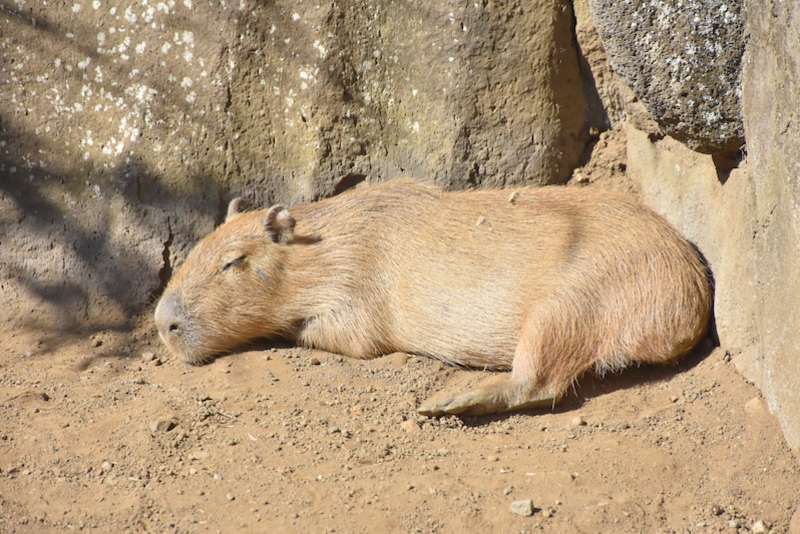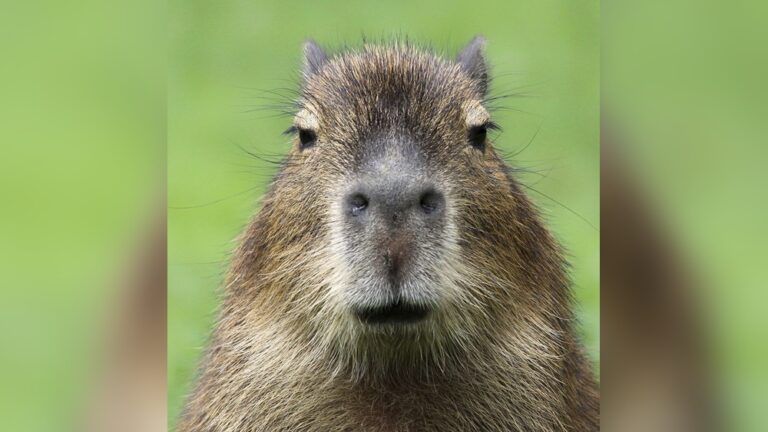Capybaras Sleep: Surprising Facts About Their Unique Rest Patterns
Have you ever wondered how capybaras sleep? These gentle giants are known for their calm and social nature, but their sleep habits might surprise you.
Understanding how capybaras rest can give you a fresh perspective on relaxation and balance in your own life. Keep reading to discover fascinating facts about their sleep patterns and what makes these animals so unique when it comes to catching some z’s.
You’ll be amazed at what you learn!

Credit: www.reddit.com
Capybara Sleep Basics
Capybaras have unique sleeping habits that help them stay safe and healthy. Understanding these habits gives us a glimpse into their calm and social nature. Their sleep patterns are simple but suited perfectly to their environment.
They do not sleep for very long at a stretch. Instead, they take short naps throughout the day and night. This helps them stay alert to danger and remain active in their social groups.
Typical Sleep Duration
Capybaras usually sleep between four and six hours daily. Their sleep is spread out in short periods rather than one long session. This pattern helps them watch for predators. It also fits their need to eat and stay social.
They often rest during the hottest part of the day. Nighttime is also a common time for sleep. Their light, scattered sleep keeps them ready to move quickly if needed.
Sleep Environment Preferences
Capybaras prefer safe, quiet places to sleep. They like to rest near water, which helps them escape quickly if threatened. Dense grass or bushes provide cover and comfort.
They often sleep in groups, which adds protection. Being close to others helps them feel safe. This social sleeping also strengthens bonds within the group.

Credit: www.japan.travel
Daytime Naps
Capybaras are known for their relaxed nature and love for resting. Daytime naps play a key role in their daily routine. These naps help them stay alert and healthy while enjoying their environment. Understanding how often and how long capybaras nap gives us insight into their calm lifestyle.
Frequency And Length
Capybaras take several short naps throughout the day. These naps usually last from 10 to 30 minutes. They rarely sleep for long periods during daylight hours. This pattern helps them avoid predators and stay active. Short naps refresh their energy without making them too vulnerable.
Safety In Numbers
Capybaras feel safer napping in groups. They often rest close to each other. Group naps allow some capybaras to stay awake and watch for danger. This teamwork helps protect the whole group. Sleeping together also strengthens their social bonds and trust.
Nighttime Rest
Capybaras are social animals that need rest for good health. Nighttime rest is important for these gentle creatures. Their sleep habits at night help them stay alert and safe. Understanding how capybaras sleep after dark gives us insight into their natural lives.
Sleep Patterns After Dark
Capybaras sleep in short bursts during the night. They do not sleep deeply for long hours. Instead, they rest lightly and wake often. This helps them stay aware of their surroundings. Their sleep is spread out rather than continuous. They may nap while staying close to water or their group.
Influence Of Predators
Predators affect how capybaras sleep at night. They stay alert to avoid danger. Capybaras often sleep near water for quick escape. They choose safe spots to rest in groups. Being in a group helps them watch for threats. Their light sleep helps them react quickly to predators.
Social Sleeping Habits
Capybaras are very social animals, and their sleeping habits show this clearly. They rarely sleep alone. Instead, they gather in groups to rest. This habit helps them stay safe and feel calm. Sleeping together also strengthens the bonds between capybaras. Their social sleeping habits are key to their survival and comfort.
Group Resting Benefits
Capybaras sleep in groups for safety. More eyes can watch for danger. This lowers the chance of surprise attacks. Group resting also keeps them warm during cold nights. The closeness helps keep their body heat steady. Being in a group reduces stress and makes sleep deeper. It also creates a sense of community among them.
Physical Contact During Sleep
Physical touch is common when capybaras sleep. They lie close or even touch each other. This contact provides comfort and calmness. It helps reduce fear and anxiety. Touching also strengthens their social bonds. This closeness is vital for their emotional health. It shows how much they depend on each other for safety and trust.
Unique Sleep Adaptations
Capybaras have special ways of sleeping that help them stay safe. Their sleep is different from many other animals. These adaptations help capybaras survive in the wild. They can rest while still staying alert to danger.
Understanding these unique traits gives us a new view of how animals sleep. Capybaras balance rest and awareness with clever methods.
Half-brain Sleep Phenomenon
Capybaras can sleep with one half of their brain at a time. This is called half-brain sleep. One side stays awake while the other rests. This helps them watch for predators even while sleeping.
This type of sleep is rare in mammals but common in some aquatic animals. It allows capybaras to stay safe near water. They can quickly react if danger appears.
Alertness And Quick Awakening
Capybaras wake up very fast if they sense a threat. Their eyes often stay half-open during sleep. This helps them see without fully waking up.
They can jump to safety in seconds. This quick response saves their lives from predators like jaguars and caimans.
Capybaras’ sleep style shows how nature shapes animal survival skills. Their alertness during rest is key to their safety.
Environmental Impact On Sleep
Capybaras’ sleep patterns change with their surroundings. Their environment plays a big role in how well they rest. Changes in weather and nearby disturbances can affect their sleep quality and duration. Understanding these impacts helps us learn how capybaras adapt to nature.
Seasonal Changes
Capybaras adjust their sleep during different seasons. In colder months, they sleep more to save energy. Warmer seasons bring shorter sleep periods. They stay alert longer to find food and avoid heat. Light levels also affect their sleep cycles. Longer daylight means less sleep. Shorter days encourage more rest.
Habitat Disturbances
Noises and movements near capybara homes disrupt their sleep. Human activities like farming or construction can scare them. Predators nearby make capybaras stay awake and watchful. These disturbances reduce deep sleep phases. Less deep sleep means weaker rest. Quiet and safe habitats help capybaras sleep well and stay healthy.
Comparison With Other Rodents
Capybaras have unique sleep patterns compared to other rodents. Their size and environment affect how they rest. Studying these differences helps us understand their behavior better. Rodents vary greatly in how long and how they sleep. Capybaras stand out due to their social nature and semi-aquatic lifestyle.
Sleep Duration Differences
Capybaras sleep about 4 to 6 hours daily. This is less than many smaller rodents. For example, rats can sleep up to 12 hours. Mice also rest longer, around 10 to 12 hours a day. Capybaras stay alert more often, likely to avoid predators. Their shorter sleep helps them stay safe in the wild.
Behavioral Variations
Capybaras often sleep in groups. This social sleeping helps protect them. Other rodents like hamsters prefer solitude during rest. Capybaras also sleep near water, which is unusual for rodents. This habit helps them cool down and escape danger quickly. Their sleep is lighter, allowing quick reactions to threats.

Credit: www.amazon.com
Sleep And Health
Sleep plays a vital role in capybaras’ health. It helps them stay active and alert. Proper rest keeps their bodies strong and minds sharp. Without enough sleep, capybaras face many health challenges. Understanding their sleep habits reveals how important rest is for their well-being.
Capybaras usually sleep in short bursts during the day and night. This pattern helps them avoid predators and manage their energy. Their sleep time also supports immune function and growth. Healthy sleep leads to better digestion and social behavior among capybaras.
Effects On Capybara Well-being
Good sleep improves capybaras’ mood and energy levels. It helps their bodies repair tissues and fight infections. Well-rested capybaras show more curiosity and social interactions. Sleep supports brain functions like memory and learning. Lack of sleep weakens their immune system. This makes them more prone to illnesses and stress.
Signs Of Sleep Deprivation
Capybaras with little sleep become less active. They may appear restless or irritable. Poor sleep causes problems with balance and coordination. These animals might eat less or avoid social groups. Frequent yawning and droopy eyes can signal tiredness. Sleep deprivation reduces their ability to escape danger.
How Smart Pets Lover Can Help You with Capybaras Sleep
Turning Capybara Sleep Insights Into Practical Learning
Understanding how capybaras manage their daytime naps and nighttime rest offers more than just fascinating facts—it opens doors to practical learning about animal behavior and well-being. Observing their social sleeping habits, for example, highlights the importance of companionship and environment in promoting healthy rest, a lesson that resonates deeply for pet parents across all species.
As you explore these unique sleep adaptations, consider how environment influences not only capybaras but your own pets’ comfort and health. At Smart Pets Lover, we believe that every detail—like knowing when your pet prefers quiet time or how social interactions affect their sleep—can strengthen your bond and boost their quality of life.
- Observe your pet’s rest patterns for signs of stress or discomfort
- Create a cozy, secure space that mimics natural sleep environments
- Encourage social interaction when appropriate to support emotional well-being
For more tailored advice or questions about your pet’s sleep and health, feel free to reach out. Helping you nurture those special moments where every wag, purr, and chirp truly tells a story is what we’re here for.
Frequently Asked Questions
How Long Do Capybaras Sleep Daily?
Capybaras typically sleep around 4 to 6 hours each day. They are mostly active during dawn and dusk, resting during hot daylight.
Where Do Capybaras Usually Sleep?
Capybaras prefer sleeping near water bodies like rivers or ponds. They often rest in shaded areas to stay cool and safe.
Do Capybaras Sleep Alone Or In Groups?
Capybaras usually sleep in groups called herds. Group sleeping helps them stay protected from predators and maintain body warmth.
Are Capybaras Nocturnal Or Diurnal Sleepers?
Capybaras are crepuscular, meaning they are most active at dawn and dusk. They rest during the day and night.
Conclusion
Capybaras sleep in short bursts throughout the day and night. They rest near water to stay safe from predators. Their sleep helps them stay alert and healthy. Watching capybaras shows how animals adapt to their environment. Understanding their sleep habits brings us closer to nature.
These gentle creatures remind us to rest and relax too. Sleep is important for all living beings, big or small.







